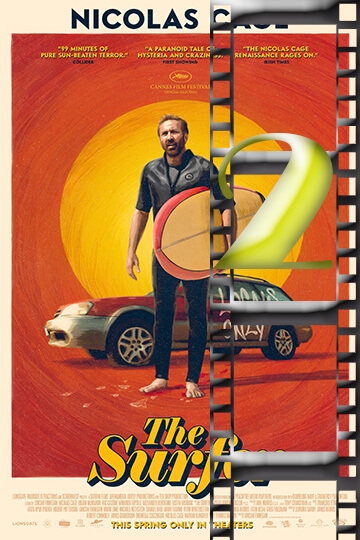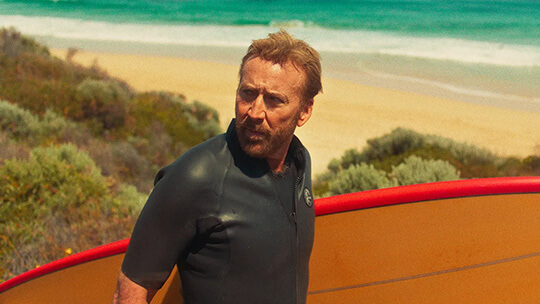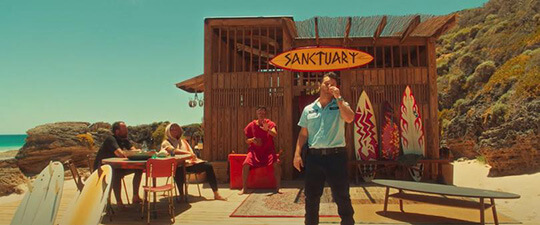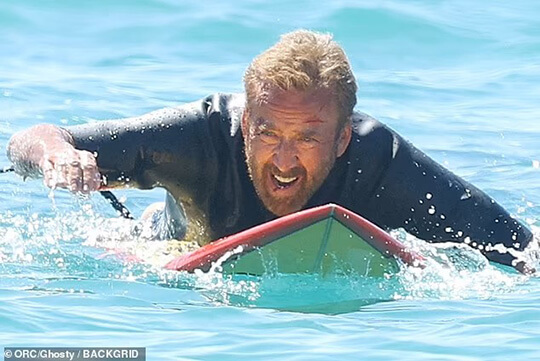
What’s It About
A man returns to the idyllic beach of his childhood to surf with his son. When he is humiliated by a group of locals, the man is drawn into a conflict that keeps rising and pushes him to his breaking point.



MOVIESinMO REVIEW
In The Surfer, Nicolas Cage plays a character who returns to Luna Beach in Australia, where he grew up before moving to America to go surfing with his son (Finn Little). However, some neighborhood hoodlums known as the Bay Boys, headed by a character called Scally (Julian McMahon), confront them and repeatedly say, “Don’t live here. Don’t surf here.” When driving his son back home, Cage’s character insists that he must leave his vehicle at the beach until he gets what he wants. Things go extremely wrong very quickly, however. Everything in his life begins to fall apart, including Cage’s identity. The question is: Will he lose everything, including his soul? The storyline is simple. Cage plays the part of a man who left his hometown in Australia some years ago after a family loss. He is now back with his son, wanting to ride the waves that he used to love and try to buy his old family home. The Bay Boys, who think they own the beach, won’t allow them to get close to the sea. Even though Cage tries to explain that he’s really from there, nobody will hear him, and they embarrass him. Although his son eventually leaves, Cage stays behind in the parking lot, staring out to sea and trying to decide what to do. As time goes by under the scorching sun, he is harassed by the Bay Boys, taunted by other residents, and loses his cash, belongings, and dignity. He starts to forage for food (at one point, he even entertains the idea of eating a dead rat) and drinks dirty water from bathroom taps and puddles. He more or less goes feral. He can simply walk away. Yet something within him insists on staying on, eager to face these bullies. So he stays on, gradually losing his sanity until the inevitable confrontation with Scally and his gang. If you dislike movies that tell you everything, you might not like this one. The only thing we can be sure of is that Cage’s character was happier when he was there and surfing. Everything else is in the balance. Is he indeed a successful businessman who is going to get everything he wants? Is he indeed failing but cannot face it? Or is he dead and just imagining all of this? The director, Lorcan Finnegan, shows quick images that merge the characters together. This shows that Cage can portray various types of manhood at once. The plot is okay at first, but the movie can’t make use of it. It starts out seeming like it’s going to talk about mid-life crisis and toxic masculinity, but it doesn’t have anything clever to say about those things. What we do get to see is Cage being humiliated over and over again, and that becomes tiresome. Then it tries to end like “Taxi Driver” with graphic violence and an offbeat twist, but it doesn’t work. Director Lorcan Finnegan, who also helmed the surreal films “Vivarium” and “Nocebo,” does a good job of depicting Cage’s deteriorating mental state and building tension in the beginning. But the movie collapses and descends from what could have been a legitimate psychological thriller into something that feels like an internet meme inflated into a feature-length film. Author Thomas Martin is less interested in telling a believable tale of a person than in trying to make some point about society. Men in this movie are like animals in the wild. Even men who have been successful, like Cage’s character, can lose everything they have because they can’t let go of the past. They’re obsessed with being accepted and imagine everybody’s out to get them. Scally, the main antagonist, is similar to those “manosphere” individuals who say that you can be a success by utilizing your “animal side.” He has the ability to bring men down to the level where they’ll admire him. It’s colonialism, taking over a public space (the beach) and making it private for people who already have a lot, which happens in the real world with beachfront property as well. If you want to have a relationship with nature, then you must become like them. As always, the best part of the film is Cage’s performance. Sure, there are plenty of bizarre moments that will turn up on YouTube montages, but he’s not being bizarre for bizarreness’ sake. He actually conveys his character’s agony at rebuilding himself after some past humiliation, possibly losing everything again, and how his desperate need to avoid that actually makes things worse. McMahon is also fine as Scally, a man who has made his worst traits into something that society embraces. This is the story of white men who are either part of or excluded from an authoritarian regime. They attempt to decide how to attack this regime without hurting anyone. They who are excluded want to get inside, and like those who are inside, they want to harm anyone who bothers them in order to show that they are important. Because they have no real cultural roots, they try to compensate by claiming territory and assembling, unlike symbolic activities like baptisms, drug use, and face painting – a type of tribal dress. It is also interesting to observe that “The Surfer” is set in Australia, a country started by people who were displaced and others who took land from other people. What’s more interesting to observe is that the only person who is actually nice to Cage is The Photographer (Miranda Tapsell), who happens to be an Aboriginal woman. She does not ask him to earn his place or try to change him. She simply says to him, “You have to forget this place. You are just not meant to be here.” The main point of the movie is likely in there, but it’s delivered in a boring-to-watch story. There’s no real epiphany, just more of the same, and then a weak try at redemption that is possibly only fictional. Finally, “The Surfer” is more of an endurance test of what you can handle. There are a lot of unsettling moments and emotional anguish that don’t resolve itself into anything good. With that said, it is relatively braver and more engrossing than recent disappointments like “Gunslingers” and the controversially hyped “Longlegs.” You can likely skip this one, just like the movie’s main protagonist, who is left stranded on the beach. If you think this seems like a good time, you may have bigger issues than the title character.
OUR RATING – A HORRIBLY WRONG 2

